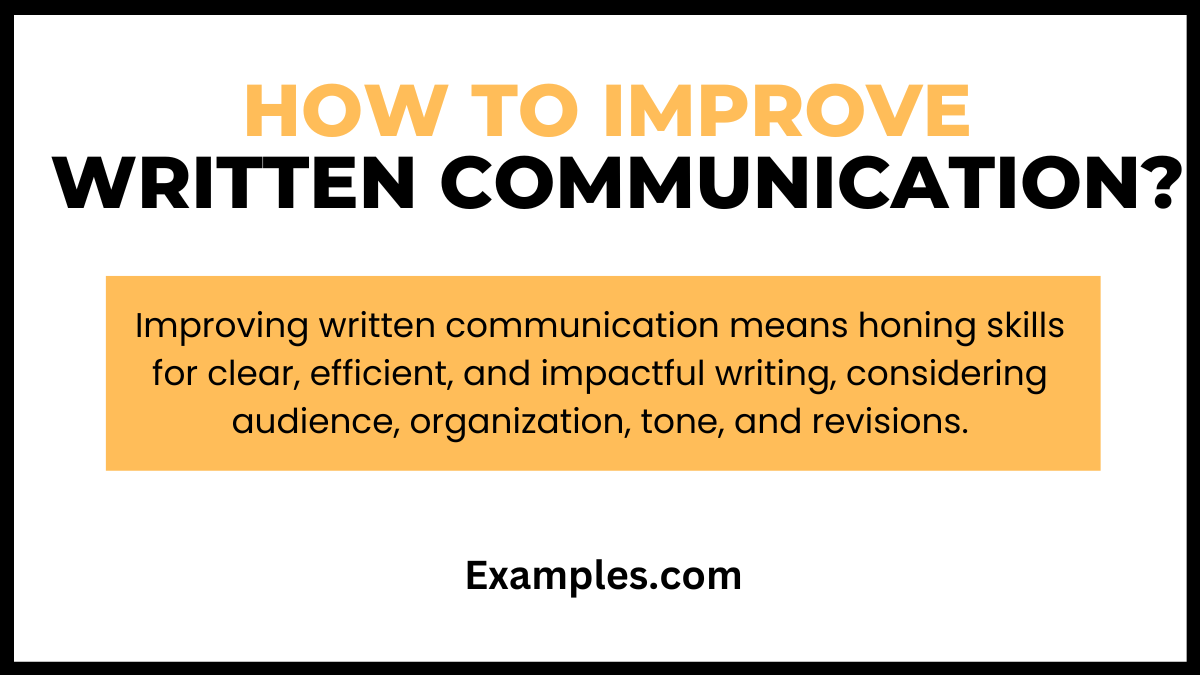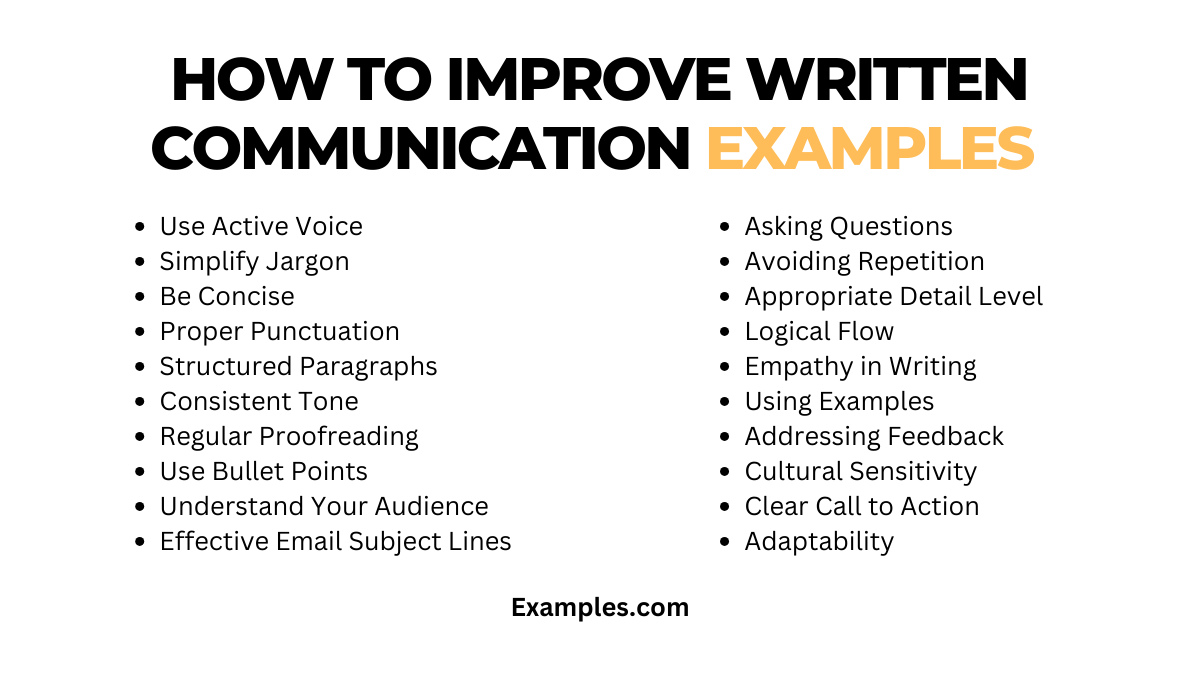How to Improve Written Communication?
Unlock the secrets of impactful dialogue with our complete guide on How to Improve Written Communication. Delve into practical strategies and real-life Communication Examples to elevate your writing skills. Whether for personal growth or professional advancement, mastering the art of clear and effective written communication is essential. This guide provides the tools to express yourself with confidence and clarity.
How to Improve Written Communication? – Meaning

Improving written communication involves enhancing the clarity, effectiveness, and efficiency of your writing. It means developing skills to convey messages concisely and precisely, making your written words impactful and understood. This process includes understanding your audience, organizing thoughts logically, employing a suitable tone, and revising content for grammar, clarity, and conciseness.
What is the Best Example to Improve Written Communication?

The best example of improving written communication is often seen in business email revisions. Initially, an email might be lengthy, unclear, or ineffective. Through revising, the writer simplifies complex ideas, uses bullet points for clarity, employs an active voice, and tailors the message to the audience’s understanding. The final version is concise, direct, and has a clear call to action, effectively improving the communication’s impact and understanding.
20 How to Improve Written Communication Examples

Improving written communication is vital for conveying clear and effective messages. Whether it’s for professional or personal development, enhancing your writing skills can lead to better understanding, productivity, and relationships. Here are 20 examples, each with a brief explanation and fix:
- Use Active Voice: Passive sentences often make writing seem weak and indirect. Use active voice for clarity and impact.
- Simplify Jargon: Overuse of technical language can alienate readers.
- Be Concise: Long-windedness can confuse readers.
- Proper Punctuation: Misuse of commas and semicolons can change the meaning of a sentence.
- Structured Paragraphs: Disorganized thoughts are hard to follow.
- Consistent Tone: An inconsistent tone can confuse readers.
- Regular Proofreading: Typos and grammatical errors reduce credibility.
- Use Bullet Points: Lists make information digestible.
- Understand Your Audience: Misjudging the audience can lead to misunderstandings.
- Effective Email Subject Lines: Unclear subjects can lead to ignored emails.
- Asking Questions: Poorly phrased questions can lead to incomplete answers.
- Avoiding Repetition: Repeating information can annoy readers.
- Appropriate Detail Level: Too much or too little detail can hinder understanding.
- Logical Flow: Disorganized content confuses readers.
- Empathy in Writing: Lack of empathy can alienate readers.
- Using Examples: Abstract ideas can be hard to grasp.
- Addressing Feedback: Ignoring feedback can perpetuate mistakes.
- Cultural Sensitivity: Insensitive language can offend or alienate.
- Clear Call to Action: Unclear instructions lead to inaction.
- Adaptability: Rigid language can deter readers.
Download Different Ways to Improve Written Communication PDF
How to Improve Written Communication for Students
Students thrive with clear and engaging communication. Enhancing this skill leads to better academic performance and clearer expression of ideas. Incorporating Written Communication Examples and understanding the Importance of Written Communication are pivotal in educational development. Here are five examples for students:
- Outline Essays Before Writing: Outlining organizes thoughts and ensures a logical flow. “First, list main ideas, then add supporting details.”
- Peer Review Sessions: Sharing work with peers for feedback improves writing quality. “Exchange papers with a classmate to provide constructive criticism.”
- Practice Different Writing Styles: Exposure to various styles enhances adaptability and skill. “Write a persuasive essay one week and a narrative the next.”
- Use Writing Prompts: Prompts stimulate creativity and can improve writing fluency. “Respond to a daily prompt in your journal.”
- Set Writing Goals: Specific targets can motivate students to improve. “Aim to increase word count or use more descriptive language.”
How to Improve Written Communication in the Work?
In the professional realm, effective written communication is crucial for success and clarity. Integrating Written Communication Sentence Examples from various scenarios and regularly consulting a Written Communication Journal can significantly enhance workplace writing. Here are five examples for the workplace:
- Email Etiquette Training: Understanding the nuances of professional emails ensures effective communication. “Always start with a polite greeting and end with a clear call-to-action.”
- Clarity in Reports and Proposals: Clear and concise language in documents presents ideas effectively. “Use bullet points to summarize findings in a report.”
- Professional Development Workshops: Regular workshops can improve various written communication skills. “Attend a seminar on persuasive writing techniques.”
- Feedback Loop: Constructive feedback helps identify areas for improvement. “Request feedback on your reports to refine your style and clarity.”
- Consistency in Brand Messaging: Consistent language strengthens brand identity. “Use the company’s tone and style guide when creating public communications.”
How to Improve Written Communication Essay?
Improving a written communication essay involves understanding the Characteristics of Written Communication and integrating them effectively. Here are five steps to enhance your essay:
- Identify the Purpose: Clearly define what you want to communicate in your essay. Understanding the objective helps in delivering a coherent message.
- Structure Your Thoughts: Organize your essay with a clear introduction, body, and conclusion. A well-structured essay makes the content more readable and understandable.
- Use Clear and Concise Language: Avoid jargon and complex vocabulary unless necessary. Clear language makes your essay more accessible to a broader audience.
- Incorporate Examples and Evidence: Use relevant examples to support your arguments. This not only strengthens your essay but also makes it more engaging.
- Revise and Edit: Always review your essay multiple times. Editing and proofreading are crucial in ensuring grammatical accuracy and flow.
What Tools and Resources can Assist in Improving Written Communication?
Various tools and resources are available to enhance written communication, particularly in Written Communication in the Workplace, Written Communication in Nursing, and Written Communication in Healthcare. Here are five valuable resources:
- Grammar and Spell Check Tools: Tools like Grammarly or Hemingway Editor help in correcting grammar and style, making your writing polished and professional.
- Online Courses and Workshops: Enrolling in courses related to professional writing, technical writing, or creative writing can significantly improve your skills.
- Writing Templates: Templates for emails, reports, and proposals can provide a starting point and ensure consistency in documents.
- Professional Editing Services: For important documents, professional editors can provide valuable insights and corrections.
- Reading and Analysis: Regularly reading well-written material in your field and analyzing its structure and style can provide insights into effective writing practices.
How to Improve Your Written Communication Skills?
To enhance skills in Written Communication in Schools, practice regularly, seek feedback, and read extensively. Focus on clarity, conciseness, and understanding your audience’s needs.
How Does Effective Formatting Impact Written Communication?
Effective formatting improves comprehension and engagement in Written Communication in Education. It makes texts easier to navigate and understand, leading to better retention and response.
What Role Does Active Listening Play in Written Communication?
Active listening informs effective Written Communication in the Classroom by understanding audience needs and feedback, leading to more targeted, empathetic, and successful communication strategies.
Tips to Improve Written Communication
Improving written communication involves honing Effective Communication for Expression. Focus on clarity, conciseness, and organization to convey messages efficiently. Pay attention to grammar and punctuation for error-free writing. Tailor your content to the audience, ensuring it resonates with them. Proofreading and seeking feedback are key steps in enhancing your written Communication Skills.
In summary, this article has delved into the realm of written communication, offering insights through examples, exploring its effects, recognizing signs of both proficiency and challenges, and providing practical solutions to enhance it. Effective written communication is a linchpin in diverse settings, fostering understanding and minimizing misunderstandings. By heeding the signs and implementing the suggested strategies, individuals can elevate their written communication prowess for greater success in various contexts.



